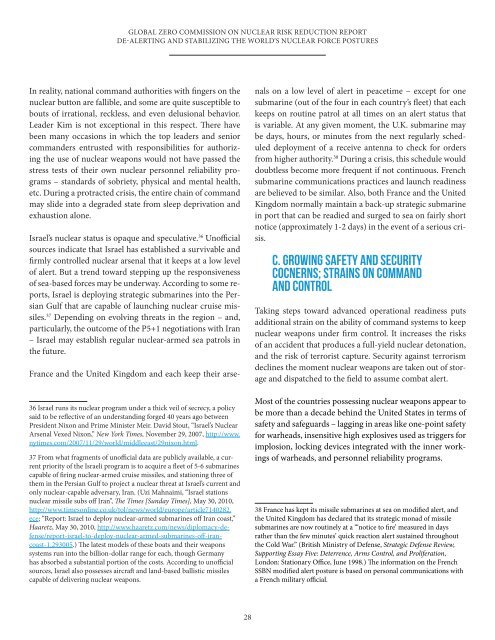global_zero_commission_on_nuclear_risk_reduction_report
global_zero_commission_on_nuclear_risk_reduction_report
global_zero_commission_on_nuclear_risk_reduction_report
You also want an ePaper? Increase the reach of your titles
YUMPU automatically turns print PDFs into web optimized ePapers that Google loves.
GLOBAL ZERO COMMISSION ON NUCLEAR RISK REDUCTION REPORTDE-ALERTING AND STABILIZING THE WORLD’S NUCLEAR FORCE POSTURESIn reality, nati<strong>on</strong>al command authorities with fingers <strong>on</strong> the<strong>nuclear</strong> butt<strong>on</strong> are fallible, and some are quite susceptible tobouts of irrati<strong>on</strong>al, reckless, and even delusi<strong>on</strong>al behavior.Leader Kim is not excepti<strong>on</strong>al in this respect. There havebeen many occasi<strong>on</strong>s in which the top leaders and seniorcommanders entrusted with resp<strong>on</strong>sibilities for authorizingthe use of <strong>nuclear</strong> weap<strong>on</strong>s would not have passed thestress tests of their own <strong>nuclear</strong> pers<strong>on</strong>nel reliability programs– standards of sobriety, physical and mental health,etc. During a protracted crisis, the entire chain of commandmay slide into a degraded state from sleep deprivati<strong>on</strong> andexhausti<strong>on</strong> al<strong>on</strong>e.Israel’s <strong>nuclear</strong> status is opaque and speculative. 36 Unofficialsources indicate that Israel has established a survivable andfirmly c<strong>on</strong>trolled <strong>nuclear</strong> arsenal that it keeps at a low levelof alert. But a trend toward stepping up the resp<strong>on</strong>sivenessof sea-based forces may be underway. According to some <strong>report</strong>s,Israel is deploying strategic submarines into the PersianGulf that are capable of launching <strong>nuclear</strong> cruise missiles.37 Depending <strong>on</strong> evolving threats in the regi<strong>on</strong> – and,particularly, the outcome of the P5+1 negotiati<strong>on</strong>s with Iran– Israel may establish regular <strong>nuclear</strong>-armed sea patrols inthe future.France and the United Kingdom and each keep their arse-36 Israel runs its <strong>nuclear</strong> program under a thick veil of secrecy, a policysaid to be reflective of an understanding forged 40 years ago betweenPresident Nix<strong>on</strong> and Prime Minister Meir. David Stout, “Israel’s NuclearArsenal Vexed Nix<strong>on</strong>,” New York Times, November 29, 2007, http://www.nytimes.com/2007/11/29/world/middleeast/29nix<strong>on</strong>.html.37 From what fragments of unofficial data are publicly available, a currentpriority of the Israeli program is to acquire a fleet of 5-6 submarinescapable of firing <strong>nuclear</strong>-armed cruise missiles, and stati<strong>on</strong>ing three ofthem in the Persian Gulf to project a <strong>nuclear</strong> threat at Israel’s current and<strong>on</strong>ly <strong>nuclear</strong>-capable adversary, Iran. (Uzi Mahnaimi, “Israel stati<strong>on</strong>s<strong>nuclear</strong> missile subs off Iran”, The Times [Sunday Times], May 30, 2010,http://www.times<strong>on</strong>line.co.uk/tol/news/world/europe/article7140282.ece; “Report: Israel to deploy <strong>nuclear</strong>-armed submarines off Iran coast,”Haaretz, May 30, 2010, http://www.haaretz.com/news/diplomacy-defense/<strong>report</strong>-israel-to-deploy-<strong>nuclear</strong>-armed-submarines-off-irancoast-1.293005.)The latest models of these boats and their weap<strong>on</strong>ssystems run into the billi<strong>on</strong>-dollar range for each, though Germanyhas absorbed a substantial porti<strong>on</strong> of the costs. According to unofficialsources, Israel also possesses aircraft and land-based ballistic missilescapable of delivering <strong>nuclear</strong> weap<strong>on</strong>s.nals <strong>on</strong> a low level of alert in peacetime – except for <strong>on</strong>esubmarine (out of the four in each country’s fleet) that eachkeeps <strong>on</strong> routine patrol at all times <strong>on</strong> an alert status thatis variable. At any given moment, the U.K. submarine maybe days, hours, or minutes from the next regularly scheduleddeployment of a receive antenna to check for ordersfrom higher authority. 38 During a crisis, this schedule woulddoubtless become more frequent if not c<strong>on</strong>tinuous. Frenchsubmarine communicati<strong>on</strong>s practices and launch readinessare believed to be similar. Also, both France and the UnitedKingdom normally maintain a back-up strategic submarinein port that can be readied and surged to sea <strong>on</strong> fairly shortnotice (approximately 1-2 days) in the event of a serious crisis.C. GROWING SAFETY AND SECURITYCOCNERNS; STRAINS ON COMMANDAND CONTROLTaking steps toward advanced operati<strong>on</strong>al readiness putsadditi<strong>on</strong>al strain <strong>on</strong> the ability of command systems to keep<strong>nuclear</strong> weap<strong>on</strong>s under firm c<strong>on</strong>trol. It increases the <strong>risk</strong>sof an accident that produces a full-yield <strong>nuclear</strong> det<strong>on</strong>ati<strong>on</strong>,and the <strong>risk</strong> of terrorist capture. Security against terrorismdeclines the moment <strong>nuclear</strong> weap<strong>on</strong>s are taken out of storageand dispatched to the field to assume combat alert.Most of the countries possessing <strong>nuclear</strong> weap<strong>on</strong>s appear tobe more than a decade behind the United States in terms ofsafety and safeguards – lagging in areas like <strong>on</strong>e-point safetyfor warheads, insensitive high explosives used as triggers forimplosi<strong>on</strong>, locking devices integrated with the inner workingsof warheads, and pers<strong>on</strong>nel reliability programs.38 France has kept its missile submarines at sea <strong>on</strong> modified alert, andthe United Kingdom has declared that its strategic m<strong>on</strong>ad of missilesubmarines are now routinely at a “‘notice to fire’ measured in daysrather than the few minutes’ quick reacti<strong>on</strong> alert sustained throughoutthe Cold War.” (British Ministry of Defense, Strategic Defense Review,Supporting Essay Five: Deterrence, Arms C<strong>on</strong>trol, and Proliferati<strong>on</strong>,L<strong>on</strong>d<strong>on</strong>: Stati<strong>on</strong>ary Office, June 1998.) The informati<strong>on</strong> <strong>on</strong> the FrenchSSBN modified alert posture is based <strong>on</strong> pers<strong>on</strong>al communicati<strong>on</strong>s witha French military official.28


